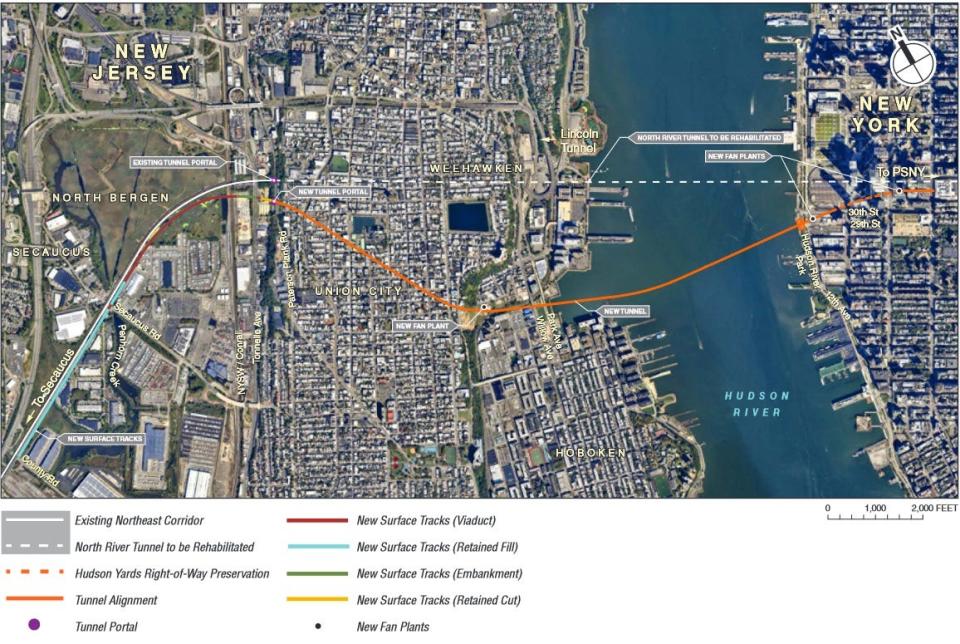Hudson tunnel project will be delayed by three years and cost $2B more, commission says
SECAUCUS — The Gateway transit commuter tunnel linking New Jersey to New York under the Hudson River will be further delayed and cost more to construct.
The new tunnel is not expected to be completed until 2035, three years later than expected and a year after some experts say the old one is supposed to be shut down, and will cost $2 billion more than estimated a year ago, the Gateway Development Commission announced.
The bi-state agency created to facilitate what is now a $16.1 billion project replacing the Portal Bridge and building a new railway tunnel under the Hudson announced Wednesday that it will be seeking new sources of funding and ways to speed the project along.
Construction began Aug. 1 on the $2.3 billion bridge portion of the project. Construction on the tunnel is now estimated to start in 2024. Once the new tunnel is finished in 2035, the old tunnel will undergo repairs expected to last until 2038.
There was no discussion about what will happen if the old tunnel must be closed before the new bridge and tunnel are completed.
Citing "pandemic-related" cost hikes and "time lost from the political delay during the last federal administration," CEO Kris Kolluri said the commission will seek additional grants made available under the Bipartisan Infrastructure Law of 2021, "ensuring we have a cost and schedule for the project that our partners and the public can rely on."
"We'll continue to mitigate these costs and speed up aspects of the project," Kolluri said. "But most critical is that we now have a path forward, working hand in hand with the federal government."
The condition of the 112-year-old bridge and tunnel has been the topic of ongoing discussion and debate.

The Portal Bridge is only 24 feet above the Hackensack River at high tide and must be opened to allow commercial boat access, delaying train traffic. A 1996 derailment was caused by the swing bridge failing to close properly, resulting in a reduced maximum speed on the bridge to 60 mph.
The tunnels were damaged when flooded with seawater during Superstorm Sandy in 2012, leading Amtrack CEO Joseph Boardman to advise the Regional Plan Association in 2014 that one or both tunnels would have to be shut down by 2034.
However, Gateway spokesman Stephen Sigmund says Boardman's comments were "entirely speculative and not based on current facts."
"There is no deadline date by which the existing tubes must be shutdown," Sigmund said. "Amtrak is investing hundreds of millions of dollars to keep the existing 112-year-old tubes functioning. They are increasingly unreliable and failing, but they are not, however, unsafe."
BRIDGE BUILD BEGINSThe Portal Bridge portion of the Gateway Project begins construction
The tunnels and bridge between Secaucus and New York Penn Station constitute a 9-mile bottleneck in the Northeast Corridor serving not only New Jersey commuters but Amtrak customers traveling between Boston and Washington, D.C. An estimated 150,000 to 200,000 riders cross it each day.
Still, the project was halted in 2010 by then-Gov. Chris Christie, who declared New Jersey could not afford its share of a $2.5 billion hike in the original $8.7 billion cost. The project picked up steam when Amtrak took it over in 2016, but was again derailed in 2018 when then-President Donald Trump's fiscal budget called for an end to the federal program that was funding the project.
SHARED COSTNew Jersey and New York agree to split cost of Portal Bridge
Gov. Phil Murphy called the project a "crucial endeavor," and pledged his continuing support.
"We remain unwavering in our commitment to affordable and accessible transportation for all New Jersey residents, commuters and visitors," Murphy said Friday.
CONSTRUCTION TIMELINEFunding first hurdle in $16 billion project
U.S. Rep. Bill Pascrell Jr. called the project "essential to the economic and social future of New Jersey and the lives of millions," promising to push for "progress as effectively and expeditiously as possible."
"I share the frustration that it took so long to even begin building," Pascrell said. "But this is a massive project. It will be done, and done right."
This article originally appeared on NorthJersey.com: Hudson tunnel project delayed by three years, cost $2B more

